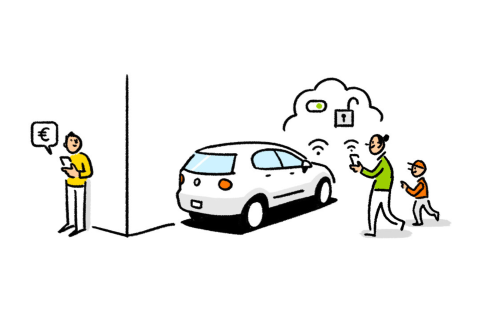30 per cent of residents in the Tesoma area could consider giving up their car
The responses of those living in Tesoma, Rahola, Ikuri and Tohloppi highlight moderate consumption and even a modest lifestyle. Local services in the area are considered sufficient, and people living in the centre of Tesoma are very satisfied with public transport services. Almost a quarter can manage without their own car, and more than half report that they use public transport for recurring journeys. Up to 30 per cent of the car users in the area say they could consider giving up their own car.
Tesoma residents are more likely to live in apartment blocks heated through central heating. In Tohloppi, electrically heated houses are common, and in Ikuri, dominated by single-family houses, ground and air source heat pumps are highlighted. Nearly 70 per cent of respondents say that they are already reducing their energy consumption by lowering temperatures and saving warm water.
Of all future solutions, residents were most interested in well thought-out shared use solutions and food waste utilisation. For example, 34 per cent of the respondents find shared use tools, machines or supplies in the area or housing company a very interesting idea. 42 per cent are very interested in the opportunity to use food waste created in the area. The idea of a general workshop where goods could be serviced or repaired using shared tools also attracts widespread interest.
Sustainable energy solutions and local food are of interest in Leinola and Vehmainen
Many families with children live in Leinola and Vehmainen, most of them in single-family houses. Electric heating is emphasised as a form of heating, and in single-family houses, minimising energy consumption by lowering temperatures and saving warm water is a very common practice. Incentives for sustainable energy transition, such as joint geothermal projects and advisory services for adjacent plots, attract interest among residents.
The greatest potential is associated with eating local and seasonal foods. For example, the residents of Leinola and Vehmainen use the REKO local food circle more actively than residents of other areas examined. 60 per cent say they are prepared to pay more for locally produced food.
The idea of shared use goods and borrowing from neighbours is even more well-received than in the other examined areas. Residents see a lot of potential in shared use goods, as long as they are easy to use.
Many households have more than one car, and giving up the car is not often seen as an option. The sustainable living solutions that residents are most interested in are actions that make everyday life more efficient, more economical or slightly more enjoyable. For example, 34 per cent of the residents in Leinola and Vehmainen are very interested in the idea of driving children to their hobbies via carpooling.





